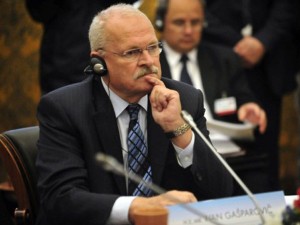European debt woes abort Slovak president’s 3-day visit
A political emergency back home related to the European debt crisis has prompted Slovak Republic President Ivan Gasparovic to postpone his three-day official visit to the Philippines.
The head of state from the former communist nation was supposed to arrive in Manila Wednesday night. Gasparovic would have been the first leader from the European Union (EU) to visit the country under the Aquino administration.
On Tuesday night, Slovakia’s Parliament failed to approve the expansion of the euro bailout fund, a development that brought down the government. The vote signaled a loss of confidence in the center-right government of Prime Minister Iveta Radicova.
It is now up to Gasparovic to name an interim government, according to his spokesperson, Marek Trubac. In the meantime, Radicova would continue as prime minister, and Trubac said elections could not take place before early spring.
In a statement Wednesday, the Department of Foreign Affairs (DFA) said Gasparovic’s visit “had to be postponed due to a pressing situation in Slovakia that needs his immediate attention.” The foreign office did not elaborate or gave a new date for the visit.
“The government of the Slovak Republic has conveyed its regrets to the government of the Republic of the Philippines,” the DFA said.
Binay welcome
Vice President Jejomar Binay was supposed to officially welcome Gasparovic with full military honors at 6:30 p.m. last night at Villamor Air Base in Pasay City.
The Slovakian leader had a scheduled meeting with President Benigno Aquino III on Friday in Malacañang to “discuss bilateral relations and exchange views on major global and regional issues,” the DFA said in an earlier advisory.
Gasparovic’s official delegation was also supposed to meet with several Cabinet officials, including Trade Secretary Gregory Domingo, Energy Secretary Jose Rene Almendras, Defense Secretary Voltaire Gazmin and Tourism Secretary Ramon Jimenez.
Gasparovic was also scheduled to be the keynote speaker at today’s 37th annual Philippine Business Conference and Exposition in Manila.
Inconceivable
With 55 lawmakers voting for the measure, nine against it and 60 abstaining, the Slovak governing coalition failed to muster the necessary votes to pass the EU plan that would have required Slovakia to contribute roughly $10 billion in debt guarantees.
The development was seen as an embarrassing and potentially costly setback for Europe’s efforts to stem the region’s sovereign debt crisis.
Politicians in capitals across Europe watched the developments in Slovakia closely. An agreement to expand the fund was reached in July by the leaders of the 17 countries that use the euro.
Malta approved the plan on Monday, leaving Slovakia as the last to take up the accord for formal consideration.
The possibility that Slovakia, a former communist country with a population of just 5.5 million, could scuttle an agreement endorsed and passed by European powers like Germany, France and Italy had seemed inconceivable.
Held hostage
The unwieldy process underscored how the entire $590-billion fund, known as the European Financial Stability Facility (EFSF), could be held hostage to the domestic politics of one tiny country, in this case Slovakia.
It also showed how a measure intended to increase confidence in the euro zone could instead emerge as a telling example of the shortcomings of a system that relies on a diverse group of nations to make and execute difficult decisions.
The EFSF was set up after Greece was first bailed out to save it from default in May 2010. Slovakia abstained from the first Greek bailout.
In a news conference after the vote, the leader of the Slovakian opposition Smer party, Robert Fico, said the “government failed in its responsibility for governing and ruling, and the prime minister bears the blame for this international shame and scandal.”
Fico said his party was ready to discuss forming a new coalition government now that the prime minister’s party had lost the vote of confidence.
‘Blackmail’
The leader of Freedom and Solidarity, Richard Sulik, who is also the Speaker of Slovakia’s Parliament, has steadfastly refused to support the financial stability fund.
Sulik contends that it is unfair to ask Slovakia, the second-poorest country among those that use the euro, to guarantee loans for richer countries like Greece and Portugal.
“If Greece had gone bankrupt right and straight at the beginning of last year it would have been the sincere and honest solution,” Sulik said, adding Greece would have been in better shape than it is today.
With regard to concerns over undercapitalized banks, Sulik said, “We are not against rescuing banks, but against Slovakia rescuing foreign banks.”
Sulik also called Radicova’s decision to hold a confidence vote along with the vote on the bailout fund a form of “blackmail.”
Radicova called on her coalition partners to reach a deal with the opposition party, which has the biggest number of lawmakers in Parliament.
“We are a small and export-oriented economy, and we need partners around us,” Radicova said. “I am convinced this government was and is a responsible, competent and reliable one.” With reports from New York Times News Service, AFP, and Jerry Esplanada and Tina Santos in Manila
Originally posted at 03:51 pm | Wednesday, October 12, 2011
